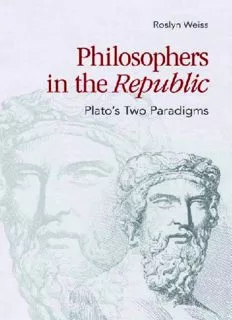
Philosophers in the "Republic": Plato's Two Paradigms PDF
Preview Philosophers in the "Republic": Plato's Two Paradigms
Philosophers in the R epublic Philosophers in the R epublic Plato’s Two Paradigms Roslyn Weiss Cornell University Press Ithaca and London Copyright © 2012 by Cornell University All rights reserved. Except for brief quotations in a review, this book, or parts thereof, must not be reproduced in any form without permission in writing from the publisher. For information, address Cornell University Press, Sage House, 512 East State Street, Ithaca, New York 14850. First published 2012 by Cornell University Press Printed in the United States of America Library of Congress Cataloging-in-Publication Data Weiss, Roslyn. Philosophers in the Republic : Plato’s two paradigms / Roslyn Weiss. p. cm. Includes bibliographical references and index. ISBN 978-0-8014-4974-1 (cloth : alk. paper) 1. Plato. Republic. 2. Justice (Philosophy) 3. Ethics. I. Title. B395.W46 2012 321'.07 — dc23 2012015970 Cornell University Press strives to use environmentally responsible suppli- ers and materials to the fullest extent possible in the publishing of its books. Such materials include vegetable-based, low-VOC inks and acid-free papers that are recycled, totally chlorine-free, or partly composed of nonwood fi bers. For further information, visit our website at www.cornellpress.cornell.edu. Cloth printing 10 9 8 7 6 5 4 3 2 1 For my beloved family Excessive friendship for oneself is the cause of all of each man’s wrongdoings on every occasion. . . . A man who is to attain greatness must be devoted not to himself or to what belongs to him, but to what is just. —Plato, Laws 5.731e-732a Contents Acknowledgments ix Introduction: Two Paradigms 1 1. Philosophers by Nature 11 2. Philosophers by Design I: The Making of a Philosopher 49 3. Philosophers by Design II: The Making of a Ruler 85 4. Socratic Piety: The Fifth Cardinal Virtue 129 5. Justice as Moderation 164 Conclusion: “In a Healthy Way” 208 Works Cited 219 Index 227 Acknowledgments This book has been percolating for many years. Writing on the R epublic is not a linear process. Interpretations seem right, then wrong, then better, yet still not just right. One tries again, goes back to the beginning. Finally, a book emerges—narrower in scope, more modest in ambition. I am grateful for the many opportunities I have had to test and refi ne my understanding of Plato’s great work. The fi rst occasion was a confer- ence organized by John Ferrari at the University of California, Berkeley. Other venues followed: St. Francis College, Mansfi eld University, the Northeastern Political Science Association, the American Philosophical Association, Marquette University, the Eastern Pennsylvania Philosophical Association, Bar-Ilan University, University of South Carolina, the Society for Ancient Greek Philosophy, University of South Florida, Case West- ern Reserve University, The Hebrew University of Jerusalem, University of Haifa, the International Symposium Platonicum—Tokyo, the Boston Area Colloquium in Ancient Philosophy, the Israel Society for the Promo- tion of Classical Studies, the Arizona Colloquium in Ancient Philosophy,
Description: